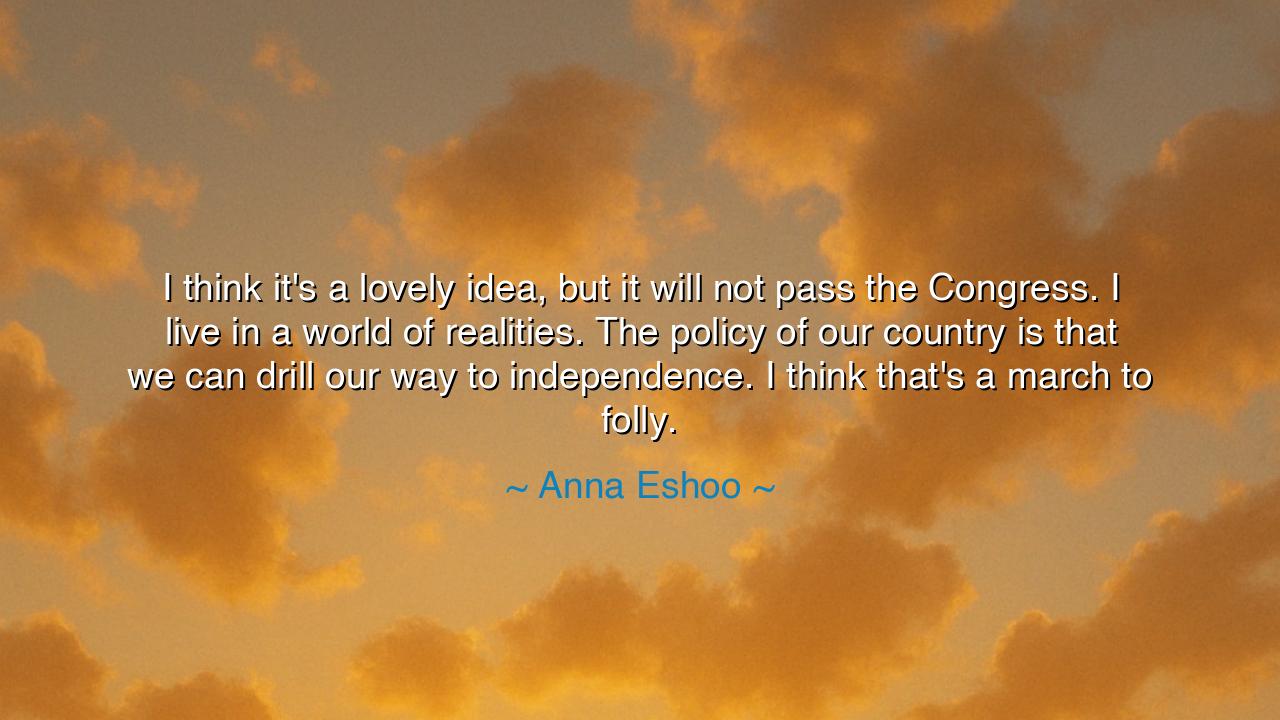
I think it's a lovely idea, but it will not pass the Congress. I
I think it's a lovely idea, but it will not pass the Congress. I live in a world of realities. The policy of our country is that we can drill our way to independence. I think that's a march to folly.






When Anna Eshoo declared, “I think it's a lovely idea, but it will not pass the Congress. I live in a world of realities. The policy of our country is that we can drill our way to independence. I think that's a march to folly,” she spoke as one who sees beyond the illusions of comfort and the mirages of false progress. Her words were uttered in a time when the world wrestled with the question of energy and sustainability, when many believed that the path to independence lay buried beneath the earth rather than rising from the light above it. In this statement, Eshoo revealed the wisdom of the pragmatist and the heart of the prophet: she saw the danger of mistaking motion for progress, and effort for wisdom.
The origin of this quote lies in the early twenty-first century, amid debates over America’s energy policy. There were those who believed that by expanding domestic oil drilling, the nation could achieve energy independence, freeing itself from dependence on foreign powers. Yet Eshoo, a congresswoman from California and a voice of reason amid political noise, looked deeper. She saw that the drilling might enrich the moment but impoverish the future — that it would chain the country to the same old habits of consumption rather than lead it toward innovation and renewal. Her words, “a march to folly,” echo like an ancient warning: that humanity, blinded by short-term gain, often walks boldly toward its own undoing.
In every age, the struggle between idealism and realism defines the fate of nations. Eshoo’s phrase, “I live in a world of realities,” is not a surrender to cynicism but a call to wisdom. The dream of endless prosperity through oil and gas may sound noble, but it ignores the truth of a finite world. The ancients would have recognized this folly well — the same hubris that led kings to exhaust their lands, their forests, and their people in pursuit of glory. Like the great city of Babylon, which fell not because it lacked walls, but because it lacked restraint, nations that consume without conscience sow the seeds of their own decline.
Eshoo’s lament that “we can drill our way to independence” is not merely political; it is moral and spiritual. For true independence, she implies, does not come from extracting more from the earth, but from mastering our desires. It is not found in deeper wells, but in higher thinking. History reminds us of this truth: when societies place convenience above foresight, they rise like fire and fall like ash. The ancient philosopher Solon of Athens once warned that “no man can call himself free who is a slave to excess.” In our age, Eshoo’s warning is the same: a nation addicted to extraction cannot call itself independent.
The march to folly she speaks of is not only the drilling of oil, but the drilling of our own future — tapping every reserve of nature without replenishing the well of wisdom. The Greeks told the story of Icarus, who, in his eagerness to reach the heavens, ignored the voice of reason and flew too close to the sun. His wings melted, and he fell. So too does humanity risk the same fate when it mistakes technological triumph for moral progress. Eshoo’s words remind us that intelligence without prudence, and industry without purpose, lead not to freedom, but to ruin.
In her warning lies also a call to courage — the courage to imagine a better path. She acknowledges that new ideas may not “pass the Congress,” but she honors them nonetheless as “lovely.” For all great changes begin as lovely ideas — fragile visions held by the few, before they become the realities of the many. The abolition of slavery, the right to vote, the dream of landing on the moon — all began as lovely impossibilities. Eshoo teaches us that realism must never suffocate hope; rather, it must temper it with wisdom. The true leader walks between both worlds — the dreamer’s sky and the realist’s ground.
So, my children of the coming age, heed the wisdom of Anna Eshoo: do not confuse exploitation with independence, nor convenience with progress. The strength of a nation lies not in the depth of its wells, but in the depth of its conscience. When faced with the easy road and the right one, choose the path that sustains not only your body but your descendants. For to drill without restraint is to feast upon tomorrow. Let your independence come not from what you can take, but from what you can create — from the renewal of spirit, the courage to innovate, and the humility to listen to the earth. That is not a march to folly — it is the march to wisdom.






AAdministratorAdministrator
Welcome, honored guests. Please leave a comment, we will respond soon